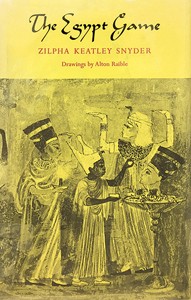The Egypt Game
 First edition | |
| Author | Zilpha Keatley Snyder |
|---|---|
| Illustrator | Alton Raible |
| Publisher | Atheneum |
This article needs additional citations for verification. (November 2015) |
The Egypt Game (1967) is a Newbery Honor-winning novel by Zilpha Keatley Snyder. Set in a small college town in California, the novel follows the creation of a sustained imaginative game by a group of six children.
Plot summary
April Hall, the daughter of an up-and-coming film actress, is sent to live with her grandmother in an old apartment house in Berkeley, California. She feels abandoned and masks her grief with truculent sarcasm and Hollywood mannerisms. Her grandmother arranges for her to meet neighbor children Melanie and Marshall Ross, and they bond over "imagining games" and a shared interest in archaeology. April also investigates a nearby antique shop run by a mysterious and somewhat spooky old man known as The Professor. In the shop's storage yard, the girls discover a replica of the famous bust of Nefertiti, leading them to create a sustained imaginary game about Ancient Egypt.
They research actual Ancient Egyptian belief systems and practices, and create their own rituals intended to reproduce them more or less authentically.
Melanie and April fear, a new girl, Elizabeth will ruin everything, but April still invites into the game if she will keep it secret.
At Halloween the children desert their trick or treat group to return to Egypt surreptitiously and are discovered by their aggressive, outgoing classmates Toby Alvillar and Ken Kamata. Ken is unenthusiastic and nonchalant initially, but Toby is fascinated, and quickly brings in useful material and ideas.
A little girl from the neighborhood disappears and is found murdered, the second such crime in a year. All the children from the area are kept indoors for several weeks.
When allowed to play outdoors again, the "Egyptians" devise an oracle connected to Thoth, and are unnerved by some of its answers. A series of unexplained events lead them to wonder if they should stop playing completely.
April returns to Egypt at night to retrieve a lost schoolbook, and is attacked by the murderer. The Professor witnesses the attack, breaks the back window of his store and shouts for help. Professor tells the children that he has been watching the game the whole time, intrigued by how they interpreted and recreated Egyptian myths and history. A widower, he became reclusive after his wife's death.
The children feel that the game cannot continue because its essential secrecy has been destroyed. The book ends with April raising the possibility of a new game involving Gypsies.
Legacies
Snyder followed up on the plot possibility hinted at in the end of the book by writing The Gypsy Game in 1997, which follows up directly on the characters and story of The Egypt Game.
Gaming scholar Cathlena Martin demonstrated how Snyder's book preceded and laid the ground for the role-playing gameplay designs of Dungeons & Dragons (1974), in "involving a player’s immersion in world building, collaboration, and role playing."[1]
Reception
A cautionary summary in the Kirkus Reviews in 1967 notes that the book has both “all the elements for ten, eleven-year-old enjoyment” but also the murder of a child in which “the demented killer is both tangential to the plot and a questionable component in a book for this age.”[2] The Bulletin of the Center for Children’s Books, however, said the book “is strong in characterization, the dialogue is superb, the plot is original.”[3] In 2013, National Public Radio included The Egypt Game in its list of "100 Must-Reads for Kids 9-14."[4]
In 1970, the novel was named as a Lewis Carroll Shelf Award, an American literary award conferred on books annually by the University of Wisconsin–Madison School of Education.
In 1973 it received the George C. Stone Recognition of Merit award, given by Bookology, a magazine of children's literature.
References
- ^ Martin, Cathlena. 2018. “Role Playing in Children’s Literature. Zilpha Keatley Snyder and The Egypt Game.” American Journal of Play 10 (2): 208–28. quote from p. 226.
- ^ Kirkus Reviews. The Egypt Game. March 1, 1967.https://www.kirkusreviews.com/book-reviews/zilpha-keatley-snyder/the-egypt-game/
- ^ Martin, Douglas. “Zilpha Keatley Snyder, Author of Eerie Children’s Tales, Dies at 87.” New York Times, Oct. 13, 2014. https://www.nytimes.com/2014/10/14/books/zilpha-keatley-snyder-author-of-eerie-childrens-tales-dies-at-87.html
- ^ NPR, "The Ultimate Backseat Bookshelf: 100 Must-Reads for Kids 9-14". August 5, 2013. https://www.npr.org/2013/08/05/207315023/the-ultimate-backseat-bookshelf-100-must-reads-for-kids-9-14
